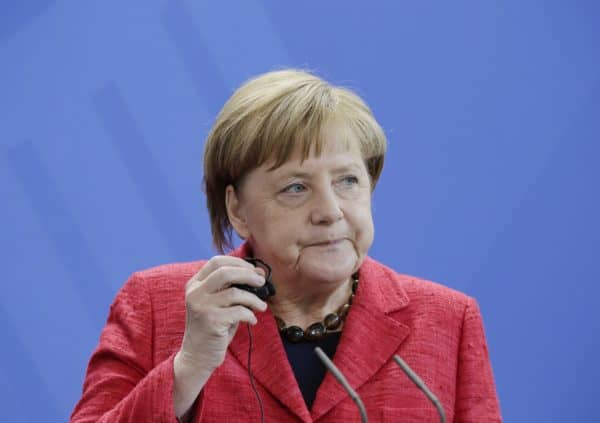The German Election is a Christian Civil War
Noah B. Strote, Foreign Policy, September 11, 2017

Angela Merkel (Credit Image: © Imago via ZUMA Press)
The true winner of Germany’s much-anticipated chancellor’s debate last week wasn’t even present on stage at the event. Millions of voters tuned in to watch a decisive duel between the leaders of the country’s two largest parties, Angela Merkel of the Christian Democrats and Martin Schulz of the Social Democrats, but what they witnessed instead was a discussion dominated by the specter of a third, ascendant party that has recently burst onto the political scene: Alternative for Germany (AfD), a right-wing organization led by breakaway members of Merkel’s Christian Democratic bloc. According to the latest polls, this populist group has climbed to the number-three spot in the lead up to the general vote on September 24. Political analysts predict it has the potential to become much larger and much more disruptive in the years to come.
{snip}
The emergence of a viable alternative to the “establishment” conservative politics Merkel represents is so important because of the role played by her party, the Christian Democratic Union (CDU), in the shaping of post-Nazi Germany, where it has ruled for almost three quarters of the country’s history. The CDU was founded after World War II by men and women who vowed to protect the Christian character of the German nation and Europe as a whole, but it has always held an on-again, off-again relationship with white nationalists.
{snip}
Over time, the party’s social policy has become less and less distinguishable from Social Democracy, its leadership forced into increasingly difficult acrobatics to justify the word “Christian” in its party’s name.
{snip}
But the chancellor’s lack of piety appears not to have bothered the more conservative members of her Christian party — until she made the decision in 2015 to allow hundreds of thousands of non-Christian, non-white refugees from the Middle East into Germany. It was only at that point that many began to jump ship in favor of the new rival Christian conservative party, Alternative for Germany, which had been founded two years prior.
The founders of the AfD took their name from a phrase Merkel used in 2013, “There is no alternative,” when arguing in support of the German-led bailout of the Greek government, which she said was necessary to maintain the economic integrity of the European Union. While signifying its nationalism and Euroskepticism, the word “alternative” pulls double duty as a description of the party’s goal to become the true guardian of Germany’s — and Europe’s — Christian identity.
Despite disavowal by a majority of the country’s bishops, several influential Catholic and Protestant theologians have come out in favor of the AfD or urged their listeners and readers to take their arguments seriously. The manifesto of their organization, “Christen in der AfD,” calls for a strengthening of religious consciousness in public education and warns that an evaporation of Christian identity would “endanger nothing less than the foundations of our system of state and of our civilization.”
{snip}
Beyond their call for the devolution of the European Union, the AfD’s policy recommendations are easy to sum up: stop Muslim immigration and foster the production of white children through family welfare. Its candidates are citing a recent government report that nearly 400,000 more Syrians could come into the country in 2018 just through “family reunification” policy, creating what she calls “social chaos.” In its election posters, the party shows young women on the beach with the slogan “Burkas? We’re into bikinis” and a young pregnant white woman with the phrase “New Germans? Let’s make them ourselves.”
{snip}
The AfD is eager to show that Merkel and the CDU will not dare to fight for what it has always claimed to value: the conservation of a Christian Germany and Europe. And in doing so, they are exposing the tension inherent in the CDU’s program: the repressed assumption that the maintenance of a certain type of ethnic majority is necessary for that project. The AfD claims it is no more deserving of the “white nationalist” label than the historic CDU upon which it is modeled.
The conflict between the AfD and the CDU in Germany sheds light on the current civil war between the pro-Trump wing and the establishment wing of the Republican Party, the dominant representative of Christian politics in the United States.
{snip}
According to the latest polls after the campaign, the AfD will take around 10 percent of the vote, but this may be just the beginning. According to the Berlin political scientist Oskar Niedermeyer, the potential for its brand of populism is great given the way that migration has polarized German society.
{snip}
Merkel said in the debate last week that a CDU coalition with the racist AfD was out of the question. She has also insisted that right-wing extremism must be confronted not only in Germany but “no matter where it happens in the world.” What she cannot say in public, however, is that the history of her own party is deeply rooted in the type of politics she now condemns.















